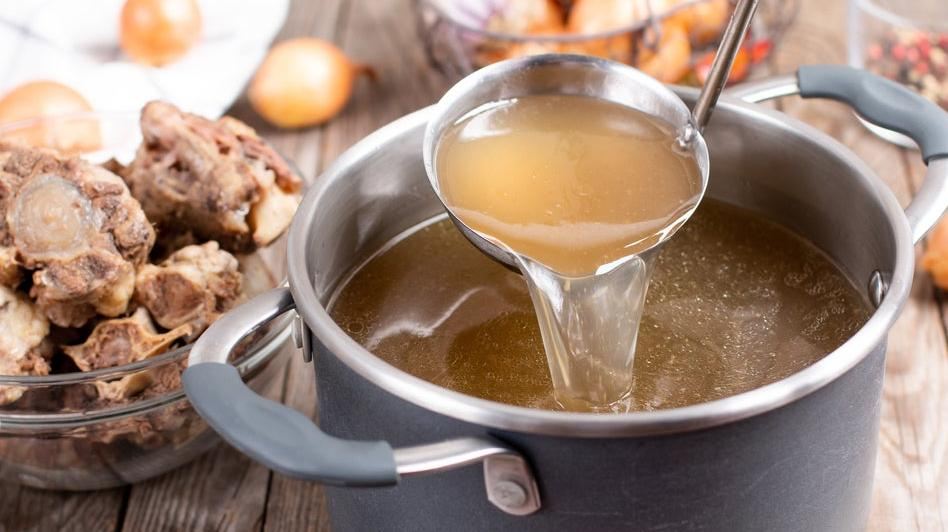The Bold Claims And Big Promises Of Collagen-Infused Foods
Collagen is big business, regardless of whether it works the way we want it to.
Ask anyone who knows me well and they'll tell you that I'm usually leery about new or emerging food trends, the most recent one being probiotic sodas. While my mother touts the latest vitamins and supplements in the same manner as she does religion, I take a more cautious approach. I question everything. Could this be another Whole30? Another pink sauce? Another detox diet?
So when I saw a press release in late July for the first ever marine collagen infused wine, I was skeptical. Made by PureWild Co., a company founded in Ojai, California by Cindy Convery of the Choctaw Nation, the wine was developed as "Cindy was looking for a high quality source of marine collagen to help with knee issues developed after strenuous spin and dance classes."
While I'm a big fan of women-owned businesses, especially BIPOC ones, I couldn't help but question the long-term (or even short-term) health benefits of using collagen in products such as wine. Why not just buy collagen supplements? Or perhaps consume one of the many foods that naturally contain collagen? Why go to the work of extracting it and putting it in other products? The answer lies in what collagen is believed to be, rather than what it actually is.
What is collagen?
Considered to be the most abundant protein in your body, collagen is derived from Greek word "kólla," which means "glue." Think of it as a protein that binds our bones and tissues together, helping skin cells grow and stay elastic. Collagen has been dubbed the "fountain of youth" because its fiber-like structure is what helps us stretch, move our bodies, and keep our skin looking youthful.
As we get older, though, our bodies naturally produce less collagen. This reduction in collagen can also occur externally from repeated sun exposure, smoking, excess alcohol consumption, and more. The (supposed) answer to our sagging skin and joint problems? Collagen supplements, of course.
Many of the collagen supplements on the market are hydrolyzed, which means that the protein has been broken down to allow for quicker absorption. This is because the human body cannot absorb collagen in its whole form. Collagen is derived from poultry such as chicken, but it can also come from pigs, cows, and fish. The latter is known as marine collagen, the same ingredient that Convery uses in her PureWild Co. wine.
Which foods are good sources of collagen?
When I looked into whether or not one should eat foods with collagen, the evidence was vague. Harvard's School of Public Health lists a variety of products, including bone broth, tough cuts of red meat such as brisket, and chuck steak as foods that contain collagen. But as anyone who follows the news already knows, there is increasing evidence that ingesting significant amounts of red meat is probably not the best thing you can do for the environment, given our ongoing climate crisis.
There are products that can allegedly boost our own collagen production. Again, the evidence is murky, but the idea is that eating protein-rich foods such as fish, meats, eggs, whole grains, nuts, seeds, fruits, and vegetables high in Vitamin C can do more for your health than ingesting peptides, powder, or drinking marine-collagen-infused wine. The old adage "you are what you eat" may be the key to the long-term health of your skin and joints after all. Or is it?
The “fountain of youth,” according to research
While there have been multiple studies of collagen's effects on the body, there aren't many studies that definitively prove its benefits.
"Many of the studies relied on subjective measurements like patient satisfaction and visual improvement.," Dr. Lindsey Zubritsky, a board-certified dermatologist, recently told Byrdie. "These are much more prone to anecdotal experiences and errors when reporting results."
The majority of these studies were performed on animals, whose digestive systems are different than a human's. And let's not forget that many of them were funded by the makers of collagen supplements themselves, calling into question the potential for biased results.
The beauty of our digestive system is that not everyone absorbs protein the same way. For some, the amino acids found in collagen might not break down easily, while for others, they do. Because collagen is so diverse—there are 28 different types—there's no way to know for sure which of the collagen breaks down properly in your body, if at all.
Should you add collagen to your diet?
Knowing what we know about collagen, should you make a point to eat it? While it won't directly harm you, there just isn't enough evidence to conclude that it will do anything to reverse the natural effects of aging.
"Ultimately, adequate protein intake from our diet should be enough," says Food Insight.
Until the research can demonstrate otherwise, the best thing to do is simply eat protein-rich foods, limit your sun exposure, and use sunscreen. And maybe indulge in the occasional glass of red wine or a bar of dark chocolate, both of which are known to be good for our heart health.
As for me, I'll keep doing my stretches in the morning and slather on my all-day moisturizer with SPF 15. I don't doubt Convery's wine tastes great, and if that's the case, by all means, buy it—that's reason enough to enjoy a glass of something.
